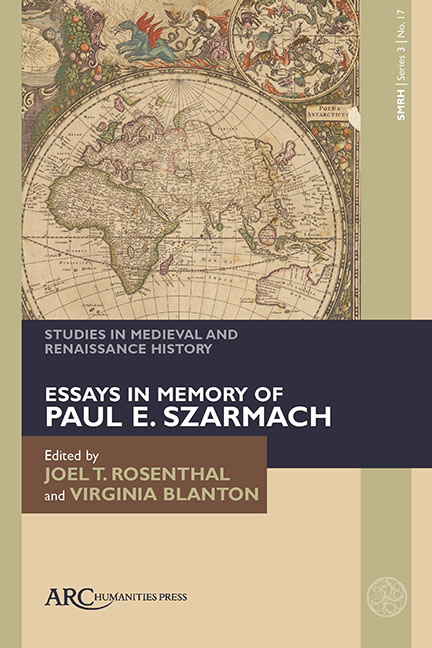Book contents
- Frontmatter
- Contents
- List of Illustrations
- Introduction
- Memories of Viking Age Cultural Contact: England in the Íslendingasögur
- Expressions of Cultural Disability: Navigating (Non)Normativity in the Hebrew–Italian Melekh Artus (King Artus)
- “All the rancour and enmity between us”. The War Between Richard, Earl Marshal, and King Henry III: Its Origins and Resolution
- Royal Consumption and Gifts of Deer in Thirteenth-Century England
- Travers and Trappe in the Palace of Pandarus: A Note
- Benedictine Devotion to England’s Saints: Thomas de la Mare, John of Tynemouth, and the Sanctilogium in Cotton Tiberius E. i
- The Rise of Admission by Apprenticeship Among the Freemen of Norwich, 1365–1415
- Nuns on the Run, or the “Sturdy and Wilful Dames” of Syon Abbey and their Disobedience to the Tudor State ca. 1530–1600
- Taking the Tour: Heritage Management in A Connecticut Yankee in King Arthur’s Court
“All the rancour and enmity between us”. The War Between Richard, Earl Marshal, and King Henry III: Its Origins and Resolution
Published online by Cambridge University Press: 13 February 2024
- Frontmatter
- Contents
- List of Illustrations
- Introduction
- Memories of Viking Age Cultural Contact: England in the Íslendingasögur
- Expressions of Cultural Disability: Navigating (Non)Normativity in the Hebrew–Italian Melekh Artus (King Artus)
- “All the rancour and enmity between us”. The War Between Richard, Earl Marshal, and King Henry III: Its Origins and Resolution
- Royal Consumption and Gifts of Deer in Thirteenth-Century England
- Travers and Trappe in the Palace of Pandarus: A Note
- Benedictine Devotion to England’s Saints: Thomas de la Mare, John of Tynemouth, and the Sanctilogium in Cotton Tiberius E. i
- The Rise of Admission by Apprenticeship Among the Freemen of Norwich, 1365–1415
- Nuns on the Run, or the “Sturdy and Wilful Dames” of Syon Abbey and their Disobedience to the Tudor State ca. 1530–1600
- Taking the Tour: Heritage Management in A Connecticut Yankee in King Arthur’s Court
Summary
SOMETIME IN THE summer of the year 1233, the first major conflict of the conflict-heavy reign of King Henry III (r. 1216–1272) began. The newly-belted Earl of Pembroke, Lord of Leinster in Ireland and of Striguil on the border of Wales and England, Richard Marshal, who inherited the titles from his older brother, William II Marshal (d. 1231), apparently objected to a number of activities and decisions of the young king, perhaps including the growing influence of Bishop of Winchester Peter des Roches and his nephew (or son), Peter de Rivaux, that affected the lives and careers of both friends and allies, such as the Earl of Kent, Hubert de Burgh, and Earl Richard's own liegeman, Gilbert Basset. Simmering below the surface for a number of months, the conflict broke out into a fully-fledged rebellion in October 1233, when the Earl Marshal brought an armed force to a parlay with the king at High Wycombe, Buckinghamshire. The king's attempts to control the growing antagonism between himself and the earl were unsuccessful. Earl Richard fled to Wales, joined forces with the Prince of Gwynedd, Llewelyn ab Iorwerth, burned the town of Shrewsbury on the mid-Wales border, and then escaped to Ireland. The rebellion raged for a few months, primarily in Wales and the Marches, led by the allies of the Earl Marshal and the sometime support of Prince Llewelyn. In Ireland, Earl Richard was wounded in a skirmish that took place on the Curragh, in County Kildare. Taken prisoner and placed under guard at his own Kilkenny Castle, Richard succumbed to an infection and died in April 1234. His allies had already begun negotiations with the king to end the rebellion at the time of his death, but King Henry—stunned into contrition by the sudden demise of his most powerful magnate—apparently agreed to concessions and welcomed the rebels to return to his grace, which they did with some alacrity.
Following the death in Ireland of this “rebel and enemy of the king,” a letter close dated 30 May 1234, written to the sheriff of Berkshire and copied to the sheriffs of thirteen other counties, the justiciar of Ireland, and constables of castles throughout the southern half of Wales, reported that Gilbert Marshal and his two remaining brothers, Walter and Anselm, were received back into the King's grace and all anger toward them was remitted.
- Type
- Chapter
- Information
- Studies in Medieval and Renaissance HistoryEssays in Memory of Paul E. Szarmach, pp. 39 - 62Publisher: Amsterdam University PressPrint publication year: 2023

